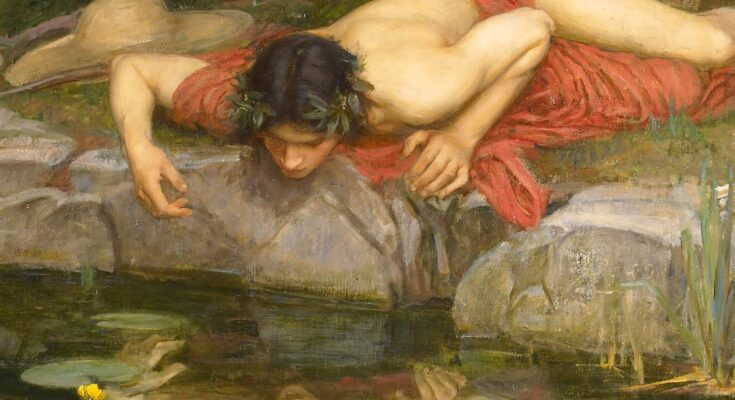For a while now, the label “narcissist” has been a buzzword for “empaths” and other psychology enthusiasts online. This word describes a person’s pursuit of personal desire, at any cost. Where does it come from, and how did it enter modern lingo?
The Myth Behind the Narcissist Label
The term “narcissism” originates from the story of Narcissus, a youth of striking beauty in Greek myth. According to legend, Narcissus was the son of the nymph Liríope and the river god Cefiso. A seer named Tiresias warned his parents that Narcissus would live a long life, but only if he never saw his own reflection. His parents, seeking to protect him, removed mirrors and reflective surfaces from his surroundings. Yet, despite their efforts, the prophecy was inescapable.
As he matured, Narcissus became the object of desire for many a nymph and muse, yet he remained resisted. Among those who admired him was Echo, a nymph who had suffered a curse from the goddess Hera. Hera, angry at Echo for distracting her while Zeus pursued his infidelities, condemned Echo to repeat only the words of others. Unable to express her love, Echo followed Narcissus silently through the woods, echoing his every word.
Echo’s Tragic Love and Narcissus’ Vanity
One day, Narcissus noticed Echo’s presence and cruelly rejected her, misunderstanding her repeated words as mockery. Heartbroken, Echo retreated to a cave, where she withered away, her voice becoming a faint whisper among the rocks. Before her death, she called upon Nemesis, the goddess of retribution, to punish Narcissus for his cruelty.
Nemesis answered her plea. One day, as Narcissus bent down to drink from a river, he saw his reflection in the water. He instantly fell in love with the image, not realizing it was his own. Mesmerized, he could not pull himself away. Consumed by this infatuation, Narcissus stopped eating and drinking. His obsession with his own reflection ultimately led to his death by the riverbank.
In place of his body, the nymphs found a flower, which they named Narcissus to honor his memory. This flower serves as a lasting symbol of the Greek myth Narcissus and its warning against vanity and self-obsession.
The Psychological Introduction of “Narcissism”
The term “narcissism” was coined in 1899 by Havelock Ellis, a British essayist and physician, during his studies of sexual perversions. He used it to describe an excessive erotic interest in one’s own body, drawing directly from Narcissus Greek mythology. Sigmund Freud later expanded the term’s meaning, using it to describe a psychological condition marked by self-centeredness and a lack of empathy. Over time, “narcissism” entered everyday language, evolving from a clinical term to a broader description of excessive self-admiration.
Today, the term is commonly used to describe those who are excessively focused on themselves, often disregarding others’ needs or feelings. The myth of Narcissus, therefore, remains relevant as it continues to inform modern understandings of personality and behavior.
The Myth’s Modern Relevance
In a world dominated by social media, where self-promotion often takes center stage, the story of Narcissus Greek mythology resonates more than ever. The myth serves as a timeless reminder of the dangers of excessive self-love and the importance of staying connected to the world around us. Narcissus’ obsession with his reflection led him to isolate himself, ultimately causing his demise. This narrative warns against the perils of losing touch with reality in the pursuit of an idealized self-image.
The myth also highlights the tragedy of unexpressed emotions and miscommunication. Echo’s curse, which left her unable to speak her mind, and Narcissus’ inability to see beyond his reflection both led to their downfall. These themes underline the importance of empathy and genuine communication in maintaining healthy relationships.
The Myth of Narcissus: Being Vain in Greek Mythology
The myth of Narcissus is more than just a cautionary tale from ancient Greece; it is a reflection of the human condition. The term “narcissism,” now deeply embedded in modern language, continues to be a reminder of the perils of vanity and excessive self-absorption. In a society where the lines between self-love and narcissism are increasingly blurred, this myth offers valuable insights into the importance of balaning self-regard and consideration for others.



